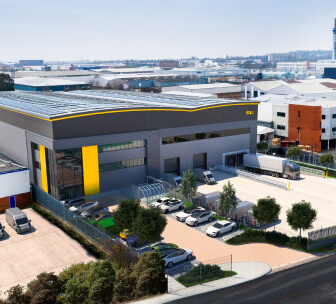
As an ultra-sustainable industrial platform, we are committed to a rapid transformation in our sector. We know that London Zero 30 regulations will change the industrial landscape and that logistics warehousing must be future proofed to deliver a greener, cleaner, less congested city. One critical area is the inevitable transition to electric vehicles which has the potential to deliver substantial cost savings and efficiencies for businesses. One of the challenges for this transition is installation of the necessary charging infrastructure, and that is an area where Gli warehouses lead the way.
An EV van travelling 20,000 miles per annum can cost between £2,500-3,000 less to operate than its diesel equivalent. Yet the transition to electrified fleets remains a topic of ongoing debate in our sector, due in-part to the need for expanded electrical infrastructure.
The Momentum of Electric Mobility
On a macro level, the UK is moving towards a future of electric mobility faster than most of us imagined. London alone has witnessed a substantial surge in plug-in vehicle adoption. According to a recent statement from the mayor’s office, there were 1,576 electric vehicles on the capital's roads in 2011, a number that grew to 69,172 by 2021. This translates to 67,596 additional units on London's streets within a decade, marking a remarkable uptick in the adoption of EV vehicles in the capital.
The London-wide introduction of Ultra Low Emission Zones (ULEZ) this year, along with low traffic zones is also clear evidence of the government’s commitment to reducing emissions and improving air quality, sending a powerful message for electrification in the transport sector.
It's evident, therefore, that the argument for businesses to transition to electric van and bike fleets is gaining substantial traction.
Redbridge Council stands as an innovative example, showcasing a remarkable commitment to greening. Their council vehicle fleet has not only transitioned to all-electric vehicles, but also harnessing solar energy to charge vehicle batteries through rooftop solar panels, the largest London council trial of its kind. These adapted vehicles have so far seen a 12,016kg reduction in C02 emissions, saved 4,600 litres of fuel and used 2,837kwh less energy compared to their non-adapted vehicles.
FedEx too, has introduced 23 Mercedes-Benz e-sprinters to its delivery fleet, maintaining that it is “ideal for serving the capital’s Ultra Low Emissions Zones.”
These examples, along with many others, serve as a model for other organisations looking to incorporate renewable energy into their logistics. But is the infrastructure in place to support the transition to all-electric fleets?
Infrastructure for the Future, Available Now
At GLi, we are proud to play our part in advancing this electric vehicle revolution. We understand the growing urgency of the situation, and we believe in acting now. As a commitment to a more sustainable future, on our single units across London, we provide 100% EV charge points for van fleets and vehicles.
Our mission is to create infrastructure for the future while making it accessible today. By providing EV charging as a standard offering, we aim to empower businesses to electrify their fleets sooner than they may have considered, reduce their carbon footprint and embrace cleaner transportation solutions. We also want to save our occupier’s money on fuel costs and empower them to expand operations; electric vehicles mean reduced noise pollution during late-night deliveries, ensuring minimal disturbance to residents living within the last mile.
We are acutely aware that the need for EV charging infrastructure is growing, and it's crucial that we meet this demand head-on, now. Whilst there are challenges for the sector’s transportation to move fully electric immediately, putting the infrastructure in place means the conversation can be expedited. We are pleased to be at the forefront of this journey, paving the way for a greener, more sustainable industrial sector.
For more information about GLi’s sustainable portfolio, please click here.


